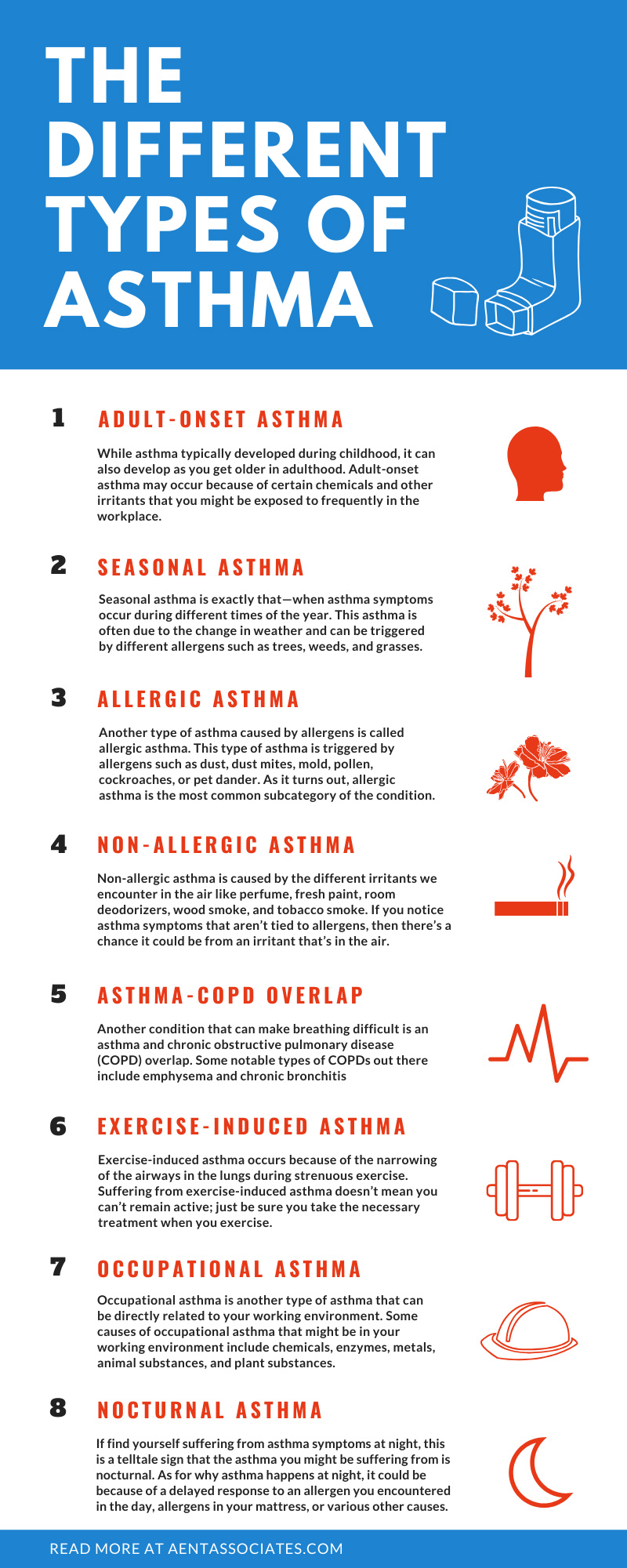
There are over 25 million people in the United States who are suffering from some type of asthma. The chronic disease can occur in anyone and causes the swelling of the airways, which can make it difficult to breathe. Because we need to breathe in order to survive, asthma is a serious condition that deserves your attention. There are also various reasons why you might have asthma in the first place. Some people might have asthma because of family history, their workplace, or allergies. To better understand the disease, learn all about the different types of asthma ahead.
Symptoms of Asthma
Before we go into all the types of asthma you could be suffering from, it’s important to know some of the signs that you have asthma in the first place. The easiest way to tell that you might have asthma is if you are frequently out of breath. However, you might also be suffering from the following:
- Chest tightness or pain
- Chronic coughing
- Sleeping issues because of coughing or wheezing
It’s never good to sit in health issues you might be suffering from for too long. If you notice these signs, make sure you see a specialist so you can properly diagnose what kind of asthma you might have.
Adult-Onset Asthma
The first type of asthma we will be looking at is adult-onset asthma. While asthma typically developed during childhood, it can also develop as you get older in adulthood. Adult-onset asthma may occur because of certain chemicals and other irritants that you might be exposed to frequently in the workplace.
Seasonal Asthma
Depending on where you live, the change in the seasons can bring out some health concerns you might need to take care of, like allergies. Seasonal asthma is exactly that—when asthma symptoms occur during different times of the year. This asthma is often due to the change in weather and can be triggered by different allergens such as trees, weeds, and grasses. Be wary of the seasonal changes to prepare for any side effects of seasonal asthma.
Allergic Asthma
Another type of asthma caused by allergens is called allergic asthma. This type of asthma is triggered by allergens such as dust, dust mites, mold, pollen, cockroaches, or pet dander. As it turns out, allergic asthma is the most common subcategory of the condition.
Non-Allergic Asthma
Not all allergies have to be caused by an allergen. Non-allergic asthma is caused by the different irritants we encounter in the air like perfume, fresh paint, room deodorizers, wood smoke, and tobacco smoke. If you notice asthma symptoms that aren’t tied to allergens, then there’s a chance it could be from an irritant that’s in the air.
Asthma-COPD Overlap
Another condition that can make breathing difficult is an asthma and chronic obstructive pulmonary disease (COPD) overlap. Some notable types of COPDs out there include emphysema and chronic bronchitis. Having conditions is known as ACOS and is often diagnosed when there is a mix of asthma and COPD symptoms.
Exercise-Induced Asthma
Exercise is one of the best things you can do for your body, but there are some dangers that you need to be aware of. As it turns out, you can have asthma from exercising. This condition is known as exercise-induced asthma, or bronchoconstriction. Asthma from exercise might cause symptoms for 60 minutes or longer if they aren’t treated. Exercise-induced asthma occurs because of the narrowing of the airways in the lungs during strenuous exercise. Suffering from exercise-induced asthma doesn’t mean you can’t remain active; just be sure you take the necessary treatment when you exercise.
Occupational Asthma
Occupational asthma is another type of asthma that can be directly related to your working environment. Some causes of occupational asthma that might be in your working environment include chemicals, enzymes, metals, animal substances, and plant substances. Some occupations that are at high-risk include food production workers, veterinarians, farmers, adhesive handlers, and others who can be exposed to these asthma-inducing substances on a regular basis.
Nocturnal Asthma
Getting quality sleep is one of the best things you can do for your health. There are several conditions that might be disrupting your sleep like sleep apnea, but there is also nocturnal asthma you need to be concerned about. If find yourself suffering from asthma symptoms at night, this is a telltale sign that the asthma you might be suffering from is nocturnal. As for why asthma happens at night, it could be because of a reclining position you are in as you sleep, a delayed response to an allergen you encountered in the day, allergens in your mattress, sleep apnea, low levels of epinephrine, or various other causes.
Asthma Treatment
The good news is there are several ways you can get the necessary treatment for having any of the different types of asthma listed above. If you notice that you are suffering from asthma symptoms, see a Houston allergist at Allergy and ENT Associates if you are in the area. The main reason why you will want to see an allergist is because there is actually a lot of overlap with asthma and allergies, so a specialist can help. Perhaps the most common form of treatment is using an inhaler. Some asthma medicine that is used for immediate relief includes:
- Short-acting inhaled beta2-agonists
- Anticholinergics
These forms of medicine are known as bronchodilators and will expand the passageways of the lungs. This will improve breathing and clear any mucus. In addition to short-term medicines, there are also some for long-term asthma issues as well that will typically be taken every day:
- Antileukotrienes or leukotriene modifiers
- Cromolyn sodium
- Inhaled corticosteroids
- Long-acting inhaled beta2-agonists (always administered with another asthma-related drug)
- Methylxanthines
- Oral corticosteroids
- Immunomodulators
Some other treatment options include immunotherapy like allergy shots or sublingual tablets, biologic therapy, and more. Because there are so many different types of asthma you could suffer from, make sure you see a specialist so you can get the necessary treatment. Unfortunately, there is no cure for asthma, but these treatment methods can help you live your life with the disease by making a necessary lifestyle change for your health.




